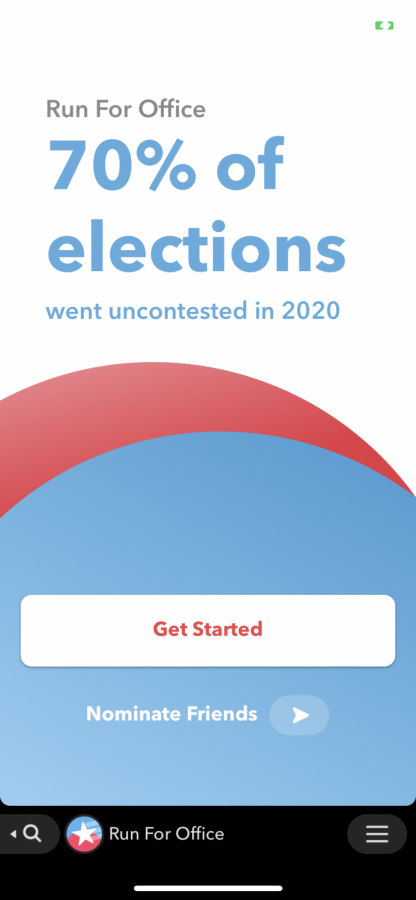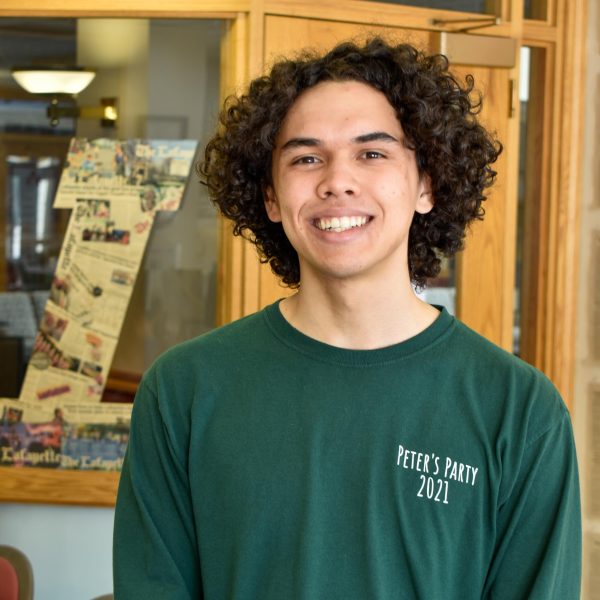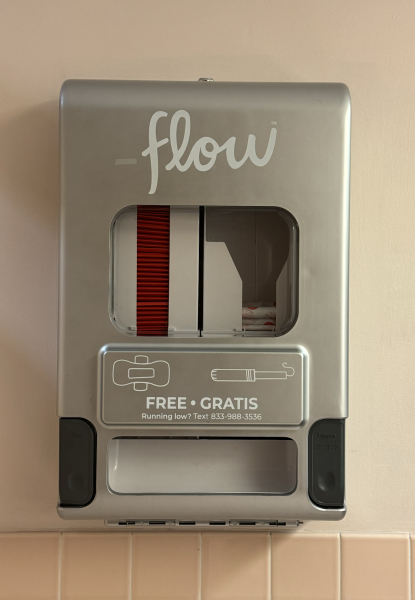New Snapchat feature encourages young adults to run for office
Snap’s Run for Office tool, pictured above, has had over 24,000 recruitment signups in its first week, according to one of its lead developers. (Photo by Trebor Maitin ’24)
October 22, 2021
Snapchat, the social media app ubiquitous among pre-teens to 20-somethings, wants you to run for office. On Oct. 5, the app known for fleeting messages and face filters launched its “Run for Office mini” in partnership with a number of candidate recruitment organizations of all political persuasions. It is perhaps its most serious civic endeavor since their voter registration push last year.
Run for Office, which can be found by searching “run” in Snapchat’s search bar, is geared towards encouraging young people to launch campaigns, especially local campaigns, of their own. all users need to do is enter their zip code. Upon opening the mini, Snapchat users are presented with a staggering statistic: over 70% of all political races went uncontested in 2020. This, along with increasingly aged representation in offices from the local to federal levels, shows a missed opportunity for young people, who may be able to run for office as soon as they turn 18.
“If we want new perspectives in politics–ones that care more heavily about the future–we need to be as involved as older generations,” Connor O’Neill ‘22, co-chair of the Lafayette College Democrats, wrote in an email. “If young people want their specific policy views represented in politics, the best way to do so is to actually run for office themselves.”
The Lafayette College Republicans did not respond to multiple requests for comment.
Assistant Professor of Government & Law Andrew Clarke said that seeing students reach for office is, in part, a goal of his classes.
“I think the way that I view all of my courses is to [give] Lafayette students a better understanding of American political power,” Clarke said. “One key part of that is understanding how individuals in the United States can access elected positions of power. They can make their own decisions on if they want to run for office, but certainly, part of that objective is so that they can have some confidence that, if they decide to run, they at least have a set of information to work with to get started.”
Eighteen to 30-year olds have historically voted at lower rates than their older counterparts, but in recent years, political engagement among younger voters has seen an uptick, with individuals under 30 turning out in record numbers last November, according to data compiled by Tufts University. Even so, getting young people to take the plunge into electoral politics is a challenge in itself, with setbacks including criticism over their inexperience and constantly moving due to college or jobs, according to Clarke. He said that one of the best ways to get involved is to surround oneself with people experienced in politics.
“One thing I would tell students who are interested in really running is to talk to the local party committee and express interest. There are places that are just really eager for people to run for office, and they can’t find them,” Clarke said. “There are also nonpartisan organizations that are looking to recruit a new generation of leaders, particularly, but not exclusively, from underrepresented groups in America. Those are places full of people that have lots of experience running campaigns, in some cases, lots of resources to help get started.”
O’Neill noted the role of technology in helping young people get into electoral politics.
“Technology has been able to increase access to political systems for all different parts of society. Perspectives that may not have been mainstream have been brought into the spotlight, making significant changes in politics and in the national conversation,” O’Neill said.
Snapchat’s Run for Office tool saw over 24,000 recruitment signups in its first week, according to a Tweet posted by Sofia Gross, a lead developer of the new function. The mini also allows users to nominate their friends to run for office; there have been over 40,000 nominations.
“I haven’t found anything like this before,” O’Neill wrote. “However, these tools that companies create are only useful and impactful if they are actually used. Technology is one step, but we need to continue pushing young people to use these platforms that are provided to them.”
















































































































